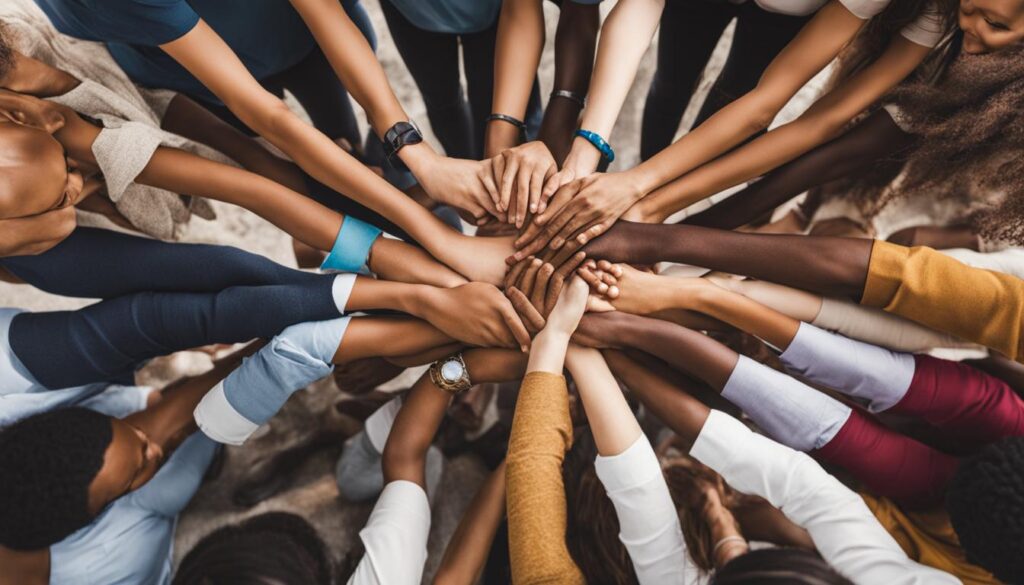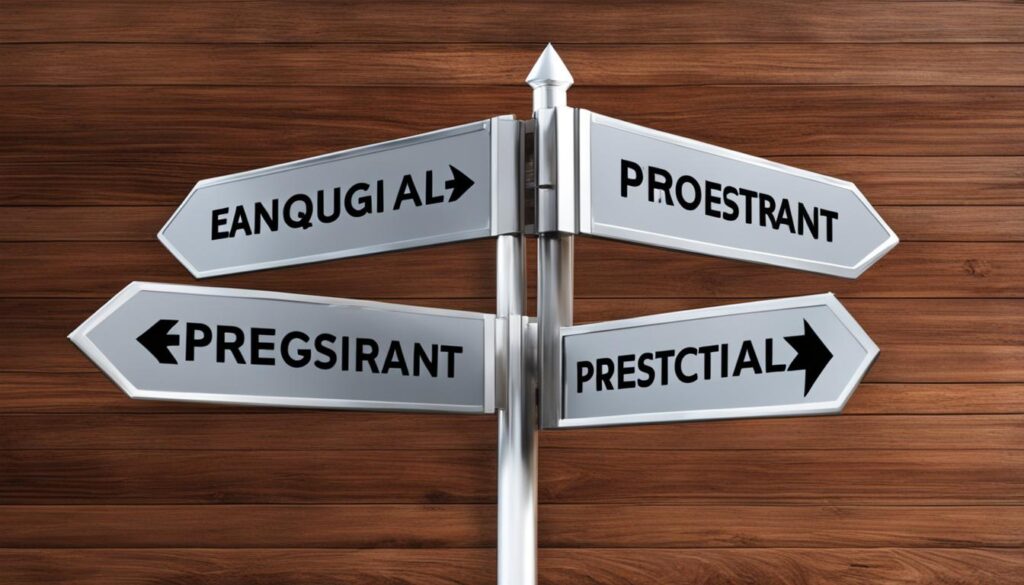Welcome to our exploration of the relationship between Protestantism and evangelicalism. In this article, we will delve into the question: Are Protestants evangelicals? Let’s uncover the fascinating aspects of these faith traditions and gain a deeper understanding of their beliefs and practices.
Protestantism and evangelicalism are two terms often used interchangeably, but they have distinct meanings. Protestantism refers to the broader Christian tradition that originated from the 16th-century Reformation movement. Evangelicalism, on the other hand, characterizes a specific subset of Protestants who hold certain core beliefs.
Throughout this article, we will explore the similarities and differences between Protestants and evangelicals, the history of the evangelical movement, the defining characteristics of evangelical belief, the ongoing debate over evangelical identity, and the relevance of evangelicalism today.
Key Takeaways:
- Protestantism and evangelicalism are related but distinct terms.
- Evangelicals hold specific core beliefs, such as the belief in the inerrancy of the Bible.
- There are similarities and differences in beliefs and practices between Protestants and evangelicals.
- The evangelical movement has a complex history and has shaped religious and political spheres.
- Contemporary evangelicalism encompasses a diverse range of beliefs and perspectives.
Similarities and Differences Between Protestants and Evangelicals
When examining the relationship between Protestants and evangelicals, it becomes evident that there are both similarities and differences that shape their respective beliefs and practices. While both groups share a belief in Jesus Christ as the way to salvation, there are key distinctions that set them apart.
Similarities:
- Belief in Jesus Christ: Both Protestants and evangelicals place a central emphasis on the belief in Jesus Christ as the ultimate guide to salvation.
- The Bible’s Importance: Both groups consider the Bible to be a sacred text, although the degree of emphasis and interpretation may vary.
- Spiritual Community: Protestants and evangelicals both value the importance of spiritual communities and fellowship.
Differences:
- View of the Bible: Evangelicals have a stronger belief in the inerrancy of the Bible, seeing it as the literal Word of God. Mainline Protestants view the Bible as a historical document open to interpretation.
- Conversion: Evangelicals emphasize the personal experience of conversion, often referred to as being “born again.” Mainline Protestants focus more on a lifelong spiritual journey.
- Evangelism: While both groups believe in spreading their beliefs, evangelicals place a greater emphasis on evangelizing and proselytizing, actively seeking to convert others.
Understanding the similarities and differences between Protestants and evangelicals allows for a deeper appreciation of the diversity within Christianity and its various expressions. It also helps to foster dialogue and understanding between individuals with different theological perspectives.
The History of Protestant Evangelicalism
Protestant evangelicalism has a rich and complex history that spans several centuries. The roots of this movement can be traced back to the 18th century, when a new style of worship emerged in America, emphasizing the experience of personal conversion and the spread of the gospel. However, it wasn’t until the 20th century that Protestants began to actively apply their faith to reforming a secular society.
This period witnessed the rise of various evangelical Protestant denominations and movements, each with their unique perspectives and approaches. One notable development was the emergence of the Christian right in the 1970s, which brought together a coalition of conservative Christians who sought to influence American politics based on their moral and religious beliefs. This alliance between evangelicalism and the Republican Party has significantly shaped American politics, with evangelicals playing a pivotal role in supporting political candidates, including President Donald Trump in recent years.
Throughout its history, evangelicalism has evolved and adapted to different social and cultural contexts. Today, there is a diverse range of evangelical denominations and movements, each with their own nuances and emphases. While some evangelicals adhere strictly to the core beliefs and practices of the movement, others have embraced more liberal or modernist perspectives. This dynamic nature of evangelicalism reflects the ongoing debate and discussions within the evangelical community regarding its identity and religious expression.
Characteristics of Protestant Evangelicals

Protestant evangelicals possess distinct characteristics that set them apart from other Christian traditions. These characteristics contribute to the unique identity and practices of the evangelical movement. Here are some key features that define Protestant evangelicals:
Biblical Authority:
Protestant evangelicals strongly uphold the authority and inerrancy of the Bible. They consider the Bible to be the inspired word of God and believe that it provides guidance for faith and practice. Evangelicals prioritize the study and application of Scripture in their daily lives.
Personal Conversion:
Another defining characteristic of Protestant evangelicals is their emphasis on personal conversion or being born again. They view conversion as a transformative experience where individuals accept Jesus Christ as their Lord and Savior and are spiritually reborn. This personal relationship with Christ is central to their faith and shapes their beliefs and actions.
Salvation through Faith:
Protestant evangelicals believe that salvation is achieved solely through faith in Jesus Christ. They emphasize the need for individuals to individually accept and trust in Christ’s sacrifice for the forgiveness of sins. This emphasis on faith distinguishes them from other Christian groups that may place more emphasis on sacraments or good works.
Commitment to Evangelism:
Evangelism is a fundamental aspect of the evangelical movement. Protestant evangelicals actively seek to spread the good news of the Gospel and share their faith with others. They engage in evangelistic efforts, such as sharing the message of salvation and inviting others to accept Jesus Christ. Evangelicals see evangelism as a way to fulfill their mission and bring others to faith.
These characteristics of Protestant evangelicals contribute to the vibrant and dynamic nature of the evangelical movement. While each individual evangelical may express these traits differently, they collectively shape the distinctiveness of the movement within the broader landscape of Protestantism.
- Biblical Authority
- Personal Conversion
- Salvation through Faith
- Commitment to Evangelism
The Debate Over Evangelical Identity

When discussing the Protestant evangelical movement, there is ongoing debate over its definition and identity. Some argue that the term “evangelical” should only be used to describe those who adhere to the four cardinal beliefs mentioned earlier: the inerrancy of the Bible, salvation through belief in Jesus Christ, personal conversion, and evangelism. However, others point out that evangelicalism has become more diverse, encompassing a range of beliefs and practices within its ranks.
One aspect of the debate centers around the inclusion of liberal evangelicals who hold more modernist views and may not align with all traditional or conservative perspectives. This diversity within the evangelical community makes it challenging to categorize all Protestants under the umbrella of evangelicalism. There are variations in beliefs and practices within the broader Protestant tradition, leading to different interpretations of what it means to be an evangelical.
Another point of contention is the relationship between Protestant beliefs and evangelical beliefs. While there are shared similarities between Protestants and evangelicals, such as the belief in Jesus Christ as the way to salvation, there are also key differences in their theological viewpoints. Protestants may have a more modernist theology and view the Bible as a historical document open to interpretation, whereas evangelicals place a stronger emphasis on the inerrancy of the Bible and a more personal, transformative experience of salvation.
The Complexity of Evangelical Identity
The complexity of evangelical identity arises from the nuanced and evolving nature of the movement. Evangelicalism encompasses a diverse array of perspectives, beliefs, and practices. It is not a monolithic entity but rather a dynamic and multi-faceted movement within Protestantism.
- Some evangelicals align with conservative politics and advocate for traditional values.
- Others emphasize social justice, environmental stewardship, and progressive causes.
- There are evangelical denominations that focus on charismatic worship and spiritual gifts.
- Still, others prioritize community engagement, humanitarian efforts, and global missions.
This diversity within evangelicalism challenges the notion of a singular evangelical identity and highlights the richness of perspectives within the movement. It is essential to approach discussions about evangelicalism with an open mind, recognizing the different interpretations and beliefs that exist within the broader Protestant tradition.
Understanding Evangelicalism Today

In contemporary society, evangelicalism continues to play a significant role in religious and political spheres. Evangelicals are known for their strong presence in American politics, often advocating for conservative values and issues. They actively engage in evangelistic activities and the spread of their beliefs, both within their communities and to the wider public. However, it is important to recognize that evangelicalism is a diverse movement, encompassing a range of beliefs, practices, and interpretations of the Bible. Not all evangelicals align with conservative politics, and there is a variety of perspectives within the evangelical community.
Contemporary evangelicalism reflects the evolving nature of religious beliefs and practices. While traditional evangelical beliefs, such as the emphasis on personal conversion and the authority of the Bible, remain central, there are also new expressions of evangelicalism emerging. Some evangelicals embrace a more inclusive and socially progressive approach, focusing on issues like social justice, environmental stewardship, and gender equality. Others may adopt a more charismatic and experiential form of worship, emphasizing spiritual gifts and supernatural experiences.
The Diversity of Evangelical Beliefs and Practices
Within contemporary evangelicalism, there are various subgroups and denominations that prioritize different aspects of faith and practice. Some evangelicals may prioritize the pursuit of personal holiness and a strict adherence to moral codes, while others may prioritize community engagement and social action. The approaches to worship, prayer, and the interpretation of scripture can also vary among different evangelical groups.
The Impact of Evangelicalism on Society
Evangelicalism’s influence extends beyond the boundaries of religious communities. The engagement of evangelicals in social and political issues has shaped public discourse and policy debates. Their strong presence in American politics has led to the association of evangelicalism with conservative values and voting patterns. However, it is important to recognize that not all evangelicals hold the same political views, and there is diversity within the evangelical community.
- Evangelicalism is a diverse movement with a range of beliefs and practices.
- Contemporary evangelicalism encompasses different approaches to worship, social action, and interpretation of scripture.
- Evangelicals have a significant presence in American politics, advocating for conservative values, but political perspectives vary within the evangelical community.
Understanding the nuances of contemporary evangelicalism is key to appreciating its impact on both religious and societal realms. By recognizing the diversity of beliefs and practices within evangelicalism, we can engage in more informed and respectful conversations about this influential movement.
Conclusion
Understanding Protestant evangelicals and the state of Protestant evangelicalism today is crucial in comprehending the diverse landscape of Christianity and its impact on society. While there are distinct beliefs and practices that set evangelicals apart from other Protestant groups, it is important to recognize the diversity and ongoing debate within the evangelical movement itself.
Approaching discussions about Protestant evangelicalism with an open mind allows for a deeper appreciation of the various interpretations and perspectives that exist within the broader Protestant tradition. By recognizing the similarities and differences between Protestants and evangelicals, we gain insight into the rich tapestry of Christian faith.
In contemporary society, Protestant evangelicalism continues to play a significant role in both religious and political spheres. While evangelicals are often associated with conservative values and advocacy, it is essential to understand that evangelicalism encompasses a range of beliefs, practices, and interpretations of the Bible. The evangelical community is diverse, and not all evangelicals align with conservative politics. Therefore, it is important to approach the topic of evangelicalism with nuance and acknowledgement of the variety of perspectives within the movement.
FAQ
Are all Protestants considered evangelicals?
No, not all Protestants are considered evangelicals. Evangelicalism is a specific subgroup within Protestantism that holds certain beliefs and practices.
What are the similarities between Protestants and evangelicals?
Both Protestants and evangelicals believe in Jesus Christ as the way to salvation. They also share a commitment to spreading their beliefs to others.
What are the differences between Protestants and evangelicals?
Evangelicals have a stronger belief in the inerrancy of the Bible and emphasize personal conversion. Mainline Protestants have a more modernist theology and focus on a spiritual journey.
What is the history of Protestant evangelicalism?
Protestant evangelicalism emerged in the 18th century and gained significant influence in America in the 20th century. This led to the rise of evangelical Protestant denominations and movements.
What are the characteristics of Protestant evangelicals?
Protestant evangelicals strongly believe in the authority and inerrancy of the Bible. They emphasize personal conversion and view it as a transformative experience. They actively engage in evangelism and proselytizing.
What is the debate over evangelical identity?
There is ongoing debate about how to define and identify evangelicalism. Some argue for a narrow definition based on specific beliefs, while others acknowledge the diversity within the evangelical movement.
How does evangelicalism impact society today?
Evangelicals continue to play a significant role in religious and political spheres. They advocate for conservative values and actively spread their beliefs through evangelistic activities.

